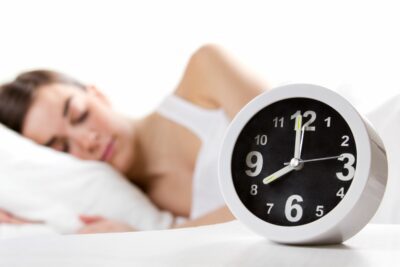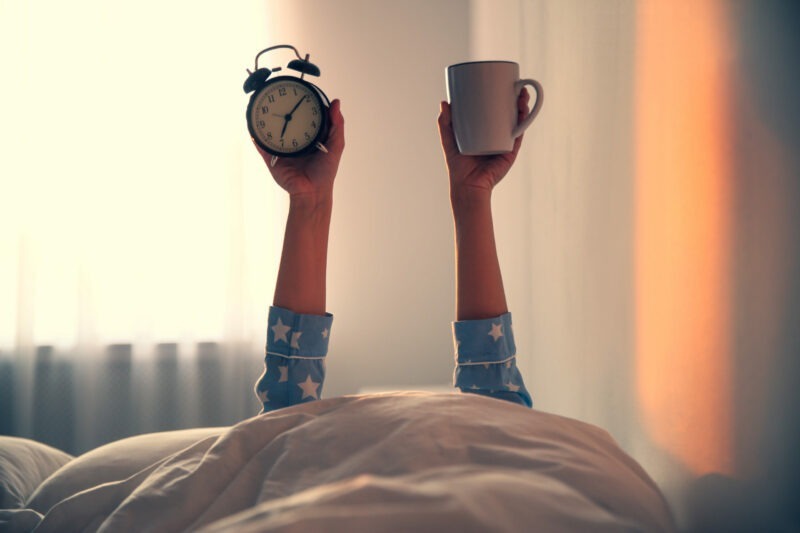
Every day we are hearing more and more reasons why sleep is so important for our bodies. When we sleep our bodies repair themselves, our brains create stronger communication paths between our neurons resulting in healthier brain function, and our organs produce vital hormones that are important for growth and development, especially in children and teens. Sleep deprivation can lead to numerous diseases such as stroke, high blood pressure, obesity, and heart failure.
Find a way to keep these 5 rules in place consistently for yourself. You will feel more rested, healthy, and peaceful having given your body the quality sleep that it needs to perform each and every day.
Get Enough Physical Activity During Each Day
Making sure to spend some quality time being active (especially outside) can help your body fall asleep faster and stay asleep longer. In fact, it has been proven that physical activity in the day can reduce the time it takes you to fall asleep by half and give you an extra 41 minutes of sleep each night. That’s 287 more minutes of sleep each week and 14,924 minutes per year!
Reduce Activities That Can Encourage Your Body To Stay Awake
Certain activities make our bodies feel more awake for long periods of time, even if they are healthful habits to maintain in your daytime routine, the timing can be important to encourage more restful sleep. Completing these activities too close to bedtime might make it harder to fall asleep at night.
- Large Meals. Large meals that leave you feeling stuffed can lead to discomfort and restlessness. Try to avoid eating too large of a meal too close to your bedtime. Finish your meals at least a few hours before bedtime.
- Caffeine. Caffeine can stay elevated in your blood up to 8 hours after consuming it and stimulate your nervous system. Cut out the caffeinated drinks early afternoon, for example, if you plan to get to bed around 9-10pm.
- Lighting and Blue Light. Exposure to bright light, particularly blue light, can trick your body into thinking it is daytime and upset your internal circadian rhythm (your body’s natural time-keeping clock). Limit screen time prior to bedtime and consider using a blue light filter on your device or with blue light filtering glasses.
- Exercise/Work Outs. While Exercising enough during the day is a great way to promote better sleep, doing it too close to your bedtime can actually have the opposite effect. When you exercise, your body produces hormones like epinephrine and adrenaline which encourage your heart to speed up and increase your blood pressure, resulting in a feeling that leaves you amped up, not calmed down. Again, get your work outs done earlier in the day so that you are able to fall right asleep at your bedtime.
Create a Relaxing Bedtime Routine and Follow it Consistently
Activities such as taking a hot bath, meditating or stretching, reading a book, or listening to calming music are all great ways to signal your brain that you are relaxed and ready to rest. Also, be sure to take into consideration your bedroom environment. Purchasing darker shades to keep out the light, turning the temperature down to be cooler than usual, and making sure you have a comfortable mattress and pillow that suit your needs are all ways to create a better sleeping environment.
Find a combination of these activities you find works best for getting your mind and body ready for sleep, and create a bedtime ritual out of it. You’ll need to carry out that routine consistently to teach your body that you are moving toward bedtime each time. In turn, you’ll be able to fall asleep faster every night.
Stay On A Schedule That Works For You and Your Body
Above we mentioned your natural circadian rhythm. Your body likes to stay on a schedule that it can count on. Disrupting that schedule on the weekends by going to bed later or sleeping in longer can throw off your rhythm. A consistent schedule reinforces your sleep-wake cycle.
Try To Avoid Moments of “Dozing” or “Nodding” Off
Many people spend their time right before bed watching TV on the couch, which can lead to dozing or nodding off for short periods of time. These small doses of sleep can revive your body just enough that when you try to head to bed for the night, you find you are no longer tired. Instead, when you find yourself getting sleepy on the couch, move yourself to your bedroom and follow through on your regular nightly routine. Your quality of sleep will be better and you will get the ZZZZ’s your body is craving.
How can a physical therapist help you get a better night’s sleep? For one, PT’s can help alleviate the pain you may be experiencing that is keeping you from getting comfortable at night. They can also create a physical activity schedule with you that is right for your body and help you achieve your movement goals.
We are medical professionals who focus on overall health and wellness. We can help.
The Great Outdoors | Unveiling The Benefits of Outdoor Exercise
In an age where digital screens dominate our lives, [...]
Your Relationship With Food | A Guest Blog by Emily Tills, MS RDN CDN of Nourished With Emily
Welcome to our guest blogger, Emily Tills, (Registered Dietitian [...]
Daily Stretching | A Guest Blog by Mallory Wisniewski Fitness
A Guest Blog By Mallory Wisniewski 300HR CYT & [...]
Spring into Action | Changes in Weather Change Your Activity Level
Spring is in the air, meaning more than just [...]
Sticking To Your Exercise Program | How To Not Fall Off The Treadmill (or Bike, or Rower…)
New Year's resolutions around fitness and exercise are incredibly [...]
10 Tips To Help You Get Up & Get Your Workout Done In The Morning
Are you struggling to peel yourself away from the [...]







